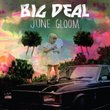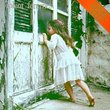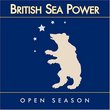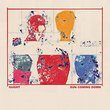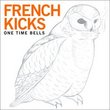| All Artists: Paavoharju Title: Laulu Laakson Kukista Members Wishing: 2 Total Copies: 0 Label: Fonal Original Release Date: 1/1/2008 Re-Release Date: 7/22/2008 Genres: Alternative Rock, Folk, International Music, Pop, Rock Styles: Indie & Lo-Fi, Europe, Scandinavia, Progressive, Progressive Rock Number of Discs: 1 SwapaCD Credits: 1 UPC: 7332181019339 |
Search - Paavoharju :: Laulu Laakson Kukista
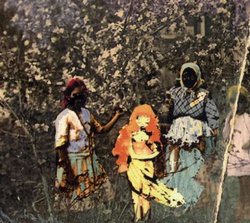 | Paavoharju Laulu Laakson Kukista Genres: Alternative Rock, Folk, International Music, Pop, Rock
This is the highly-anticipated second full-length release on Fonal Records from Finland's Paavoharju, a collective formed around two brothers -- Lauri and Olli Ainala and their troupe of associates. The group is a collecti... more » |
Larger Image |
CD DetailsSynopsis
Album Description This is the highly-anticipated second full-length release on Fonal Records from Finland's Paavoharju, a collective formed around two brothers -- Lauri and Olli Ainala and their troupe of associates. The group is a collective project of ascetic born-again Christians. Laulu Laakson Kukista (A Song About Flowers of the Valley) evokes the sounds of raindrops falling on a sheet metal roof melting together with an old television's random dot-pattern noise. Backwards pianos, backwards vocals, tilted organ and baroque beats lean against sweeping operatic soundscapes and gossamer back-porch folk singalongs. Leena Uotila's soft voice echoes in empty, dusty rooms. Cat-owls gather to the skies, apple trees are blooming and waves rock a barrel against the pier. Suddenly all this started to form esoteric mildew to cassette's magnetic tape. Sources of inspiration include Tuote Savonlinna, Saimaa, Miekkoniemi, Tove Jansson, Caspar David Friedrich, John Bauer, William Blake, Hugo Simberg, The Shadows, Burzum, Spede Pasanen, Boards Of Canada, luola, Es, Tapio Rautavaara, Raamattu, Deaf Center, Ville Leinonen, lo-fi, Portishead, Joose Keskitalo, Winsor McCayn, Pikku Nemo, Miasmah, Ingmar Bergman, Deathspell Omega, Ragnar Rock, and Ed Gein. Mind-bending devotional rock-opera from the deepest Finnish forests. Similarly Requested CDs
|
CD ReviewsThis is a great record Nathaniel E. Yielding | Baltimore, Md | 08/30/2008 (5 out of 5 stars) "Wow. I just got it today. It is really good. This is Finnish psych-folk-pop put out by a group of ascetic christians on Sami Sänpäkkilä's Fonal records. This is a lot of electronica with some fun dance songs. Definitley worth it." Worth it guyinca | USA | 01/24/2009 (5 out of 5 stars) "I am amazed that such venturous and utterly experimental music can make it into the mainstream releases with such high quality of production! Surely, there is a lot of electronic tricks involved but the effect is that of a music reaching you in atmospheric waves through the silvery spider webs and falling leaves or whatever other obstacles one finds in a magical forest. An emotional equivalent of Nocturnes of Chopin played in the park after dark, times ever so annoying beats of a club house across the river... The sound effects and quality remind me most of Amon Tobin. Melodies could easily be Renaissance or psychedelic if you wish. A very close band but in a more regular structure and with rockish rather than electronic overtones would be Espers (II)." Headphone Commute Review Headphone Commute | 11/30/2008 (5 out of 5 stars) "I'll admit - it took me more than a few listens to get into Paavoharju. I almost dismissed the album completely, but my readers kept insisting that I give it another whirl. And here it is, Laulu Laakson Kukista, opening its intricate secrets after careful observation. The crackles, the noises, the lo-fi magnetic tape manipulations dispel, and the inner beauty of modern classical marriage to neo-folk emerges. So how do I begin describing something that is indescribable. An assembly of illusions scratching at deep rooted memories of childhood, a collection of conflicting elements settling into a unique pattern of a snowflake, a kaleidoscope of loose material patched together into a summer dress that is being hung up to dry in a sunlight by a humming villager. Between the digital artifacts and purely organic ambient hymns you find something... spiritual... revived through simplicity of a pure song. And after a few listens it is that song that draws you closer towards Paavoharju's mystical sound. Laulu Laakson Kukista is the second LP from a collective of Finnish born-again Christians (!) initially organized by brothers Lauri and Olli Ainala. Their first LP, titled, Yhä Hämärää, came out on the same label, Fonal Records, in 2005. The group is not a stranger to the scene, and since their debut, Paavoharju landed an EP on Miasmah as well as a 7" on Type Records. It's nearly impossible to draw a comparison between Paavoharju and any other artist, but if I was pressed, I'd perhaps point towards the abstract experimental and psych-folk work from Boards of Canada."
|

 Track Listings (11) - Disc #1
Track Listings (11) - Disc #1

